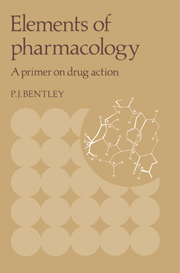Book contents
- Frontmatter
- Contents
- Preface
- 1 Introduction
- 2 Scope of pharmacology
- 3 Where do drugs come from?
- 4 The names of drugs
- 5 Techniques and methods of pharmacology
- 6 Absorption, distribution, and elimination of drugs; pharmacokinetics
- 7 The nature of responses to drugs
- 8 Receptor theory
- 9 Relationship of chemical structure to biological activity
- 10 Roles of the cell membrane in responses to drugs
- 11 Clinical aspects of the actions of drugs
- 12 Conclusion
- References
- Glossary of drugs named in the text
- Index
2 - Scope of pharmacology
Published online by Cambridge University Press: 29 January 2010
- Frontmatter
- Contents
- Preface
- 1 Introduction
- 2 Scope of pharmacology
- 3 Where do drugs come from?
- 4 The names of drugs
- 5 Techniques and methods of pharmacology
- 6 Absorption, distribution, and elimination of drugs; pharmacokinetics
- 7 The nature of responses to drugs
- 8 Receptor theory
- 9 Relationship of chemical structure to biological activity
- 10 Roles of the cell membrane in responses to drugs
- 11 Clinical aspects of the actions of drugs
- 12 Conclusion
- References
- Glossary of drugs named in the text
- Index
Summary
The study of the properties of drugs, medicines, and poisons is an old pastime that was originally practiced by the purveyors of medicaments and by professional poisoners. Until the end of the last century drugs were naturally occurring substances, organic or inorganic, most often obtained from plants so that the craft of materia medica (the collection and preparation of such drugs) was closely allied to the science of botany. Large formularies and specifications of such medicines were prepared (pharmacopoeias). The rapid expansion of the chemical industry during the last century has, however, resulted in the introduction of drugs whose numbers far exceed those entered in ancient pharmacopoeias.
Interest in pharmacology has expanded quite amazingly in the twentieth century, and its current growth rate has divided the subject matter into several separate but mutually dependent disciplines. These subdivisions include:
Pharmacodynamics, the effects and mechanisms of actions of drugs on physiological processes.
Pharmacotherapeutics and clinical pharmacology, the use of drugs in the treatment of diseases.
Toxicology, the science of poisons. Sometimes considered to be a separate science, toxicology is now often used to include knowledge about the toxic effects of drugs that are used primarily for their therapeutic actions.
Several other specialized areas of pharmacology have now appeared and have received benediction in the form of journals to publish their conclusions. Such disciplines include:
Pharmacokinetics, the quantitative description and prediction of the fate of a drug from the time of its absorption into the body until its biological actions and those of its products are terminated. Pharmacogenetics, the role of heredity in responses to drugs. Biochemical pharmacology, the actions of drugs on biochemical processes in the cell.
- Type
- Chapter
- Information
- Elements of PharmacologyA Primer on Drug Action, pp. 2 - 3Publisher: Cambridge University PressPrint publication year: 1981



